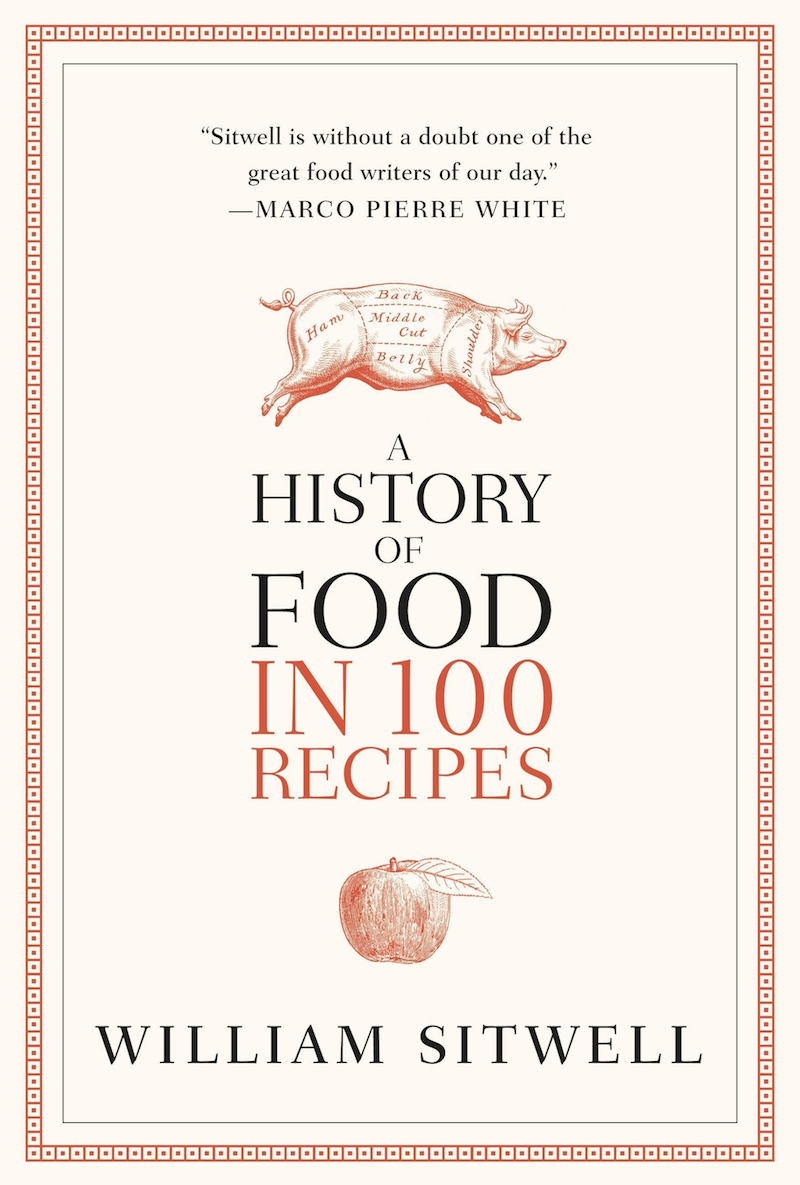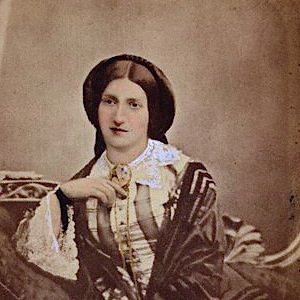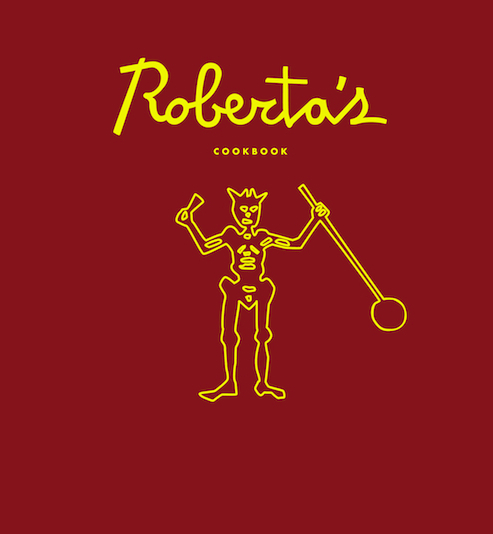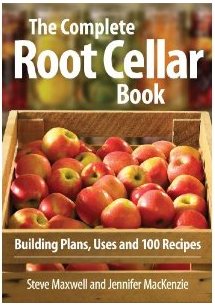
 The English author and broadcaster William Sitwell is the editor of Waitrose Kitchen magazine, and well known in the UK as a TV cooking show judge and presenter. Sitwell published The History of the Food in 100 Recipes this year, a chapter by chapter look at the evolution of our foodways from ancient Egypt to Heston Blumenthal. It’s comprehensive, but also fun (at least for dedicated food geeks like yours truly). Sitwell focuses on the characters through history that have advanced gastronomy, in all its forms from high to low. It can be read straight through, or perused randomly by vignette, so a reader might start by reading up on Apicius, and then decide to jump ahead to Nigella Lawson before circling back to Carême. In this sense, it serves as a reference book; a personality driven corollary to the Oxford Companion to Food or Larousse. And, of course, there are the 100 recipes. These are presented in their original form as well as in ‘modern translation’. In this way, Sitwell makes it possible for his readers to cook their way through the ages. I’d recommend it as a gift, but I suspect most GFR readers would rather keep a copy for themselves.
The English author and broadcaster William Sitwell is the editor of Waitrose Kitchen magazine, and well known in the UK as a TV cooking show judge and presenter. Sitwell published The History of the Food in 100 Recipes this year, a chapter by chapter look at the evolution of our foodways from ancient Egypt to Heston Blumenthal. It’s comprehensive, but also fun (at least for dedicated food geeks like yours truly). Sitwell focuses on the characters through history that have advanced gastronomy, in all its forms from high to low. It can be read straight through, or perused randomly by vignette, so a reader might start by reading up on Apicius, and then decide to jump ahead to Nigella Lawson before circling back to Carême. In this sense, it serves as a reference book; a personality driven corollary to the Oxford Companion to Food or Larousse. And, of course, there are the 100 recipes. These are presented in their original form as well as in ‘modern translation’. In this way, Sitwell makes it possible for his readers to cook their way through the ages. I’d recommend it as a gift, but I suspect most GFR readers would rather keep a copy for themselves.
I spoke to Sitwell on the phone recently from his home in Nothhamptonshire. The interview that follows has been edited.
INTERVIEW
Good Food Revolution: Is it fair to call A History of Food In 100 Recipes a cultural history?
William Sitwell: I don’t have very good concentration, I get easily bored. And also, I am a journalist who spent quite a lot of time working on tabloid newspapers. So, this is not a dry history. I don’t get bogged down in the details of who developed a particular model of a particular oven. For me, it’s very much about the people who have shaped the history of food. Rather than getting waylaid with the story of how every single ingredient emerged, I have picked out what (for me) are really interesting cultural phenomenon: how ideas have spread and how people have spread those ideas. And also the quirky stories that come out. It is a history of the world through food, if you like. And I think it’s a sort of readable skip through the centuries, stopping at various points that tickled me. But it’s not the History of Food, it’s a History of Food. Although, there are some important themes that I develop, yes, I think it is a cultural history.
GFR: What did you learn by writing the book? Were there big surprises?
WS: I learned how ignorant I was! I was amazed at the things I discovered. I loved learning about the Spanish conquistadors and their important influence on the development of food. All the amazing ingredients they discovered: turkeys, chillies, tomatoes, hot chocolate. I learnt amazing things about how recipes were written over history. And I discovered extraordinary people. In one of my favourite chapters, there’s a wonderful guy called Thomas Coryat. His discovery of the fork in his travels around Italy is fascinating and you really feel for him as he comes back to England [in the early 1600s] and writes about the fork and all his friends laugh at him and call him ‘furcifer’, which means pitchfork.
I love the story of Clarence Saunders, the American who invented what became the modern supermarket. He was a small time retailer grappling with the economic inefficiencies of stores where people would show up to be served at lunched time by men in white coats handing them things from behind a counter. He was coming back to Tennessee on a train from Indiana, and the train slows down and then stops. He was looking out and saw a mother pig feeding eight piglets and he thinks, self-service! Three months later he invents Piggly-Wiggly.
Then, there’s the story of Denis Papin, who invented an early version of the pressure cooker [in the 1890s], ‘The Steam Digester’ or ‘The Engine for Softening Bones’. When I found this in the British Library, it was amazing. You really feel for this man who went to the Royal Society to try and ask for funding but he didn’t get it. He left this beautiful book of all his passionate experiments and died a pauper’s death.
GFR: Have any of the recipes or research affect your cooking? Are you using older recipes?
WS: Oh, I wish I could say yes! The whole thing has informed me, but my general approach to food is to try and keep things simple, and to try and keep things local, and to try and keep things in season. I am like every other foodie who bangs on about those cliches, but they are true and important.
One of the things I did learn from writing the book is from Frances Moore Lappé who wrote that wonderful book, Diet for a Small Planet (1971). She was the first person in America to expand on the fact that the conversion of protein during the production of meat is so incredibly inefficient. Her’s is an amazing story (as is Alice Waters’), and reading her really cements the idea that if you’re going to eat meat, then you have got to eat good meat. And you must ask questions about where food comes from – the provenance – it’s really, really important.
There are aspects of the growth of consumerism and supermarkets that have opened my eyes and, I suppose, just made me want to eat simply and eat purely. That’s where I think you get the most satisfaction. When I judge TV cookery shows in the UK, I always think that people need to be brave enough to be simple – brave enough not to think that you have to be complicated. That’s something I think comes out through the book, that the great heroes of food across the centuries are people who have very pure and simple philosophies about it.
GFR: But you must have tried some of the old recipes?
WS: The book has a wonderful recipe for mussels in their shells from 1440. It’s beautifully simple and easy to cook and tastes as good as mussels should taste. It’s with a wine sauce and it says at the end to ‘serve it forth in it’s own broth in a dish all hot’. What a great piece of advice! People are still forgetting to warm their plates in restaurants today.
 Malcolm Jolley is a founding editor of Good Food Revolution and Executive Director of Good Food Media, the company that publishes it. He tweets as @malcolmjolley.
Malcolm Jolley is a founding editor of Good Food Revolution and Executive Director of Good Food Media, the company that publishes it. He tweets as @malcolmjolley.







